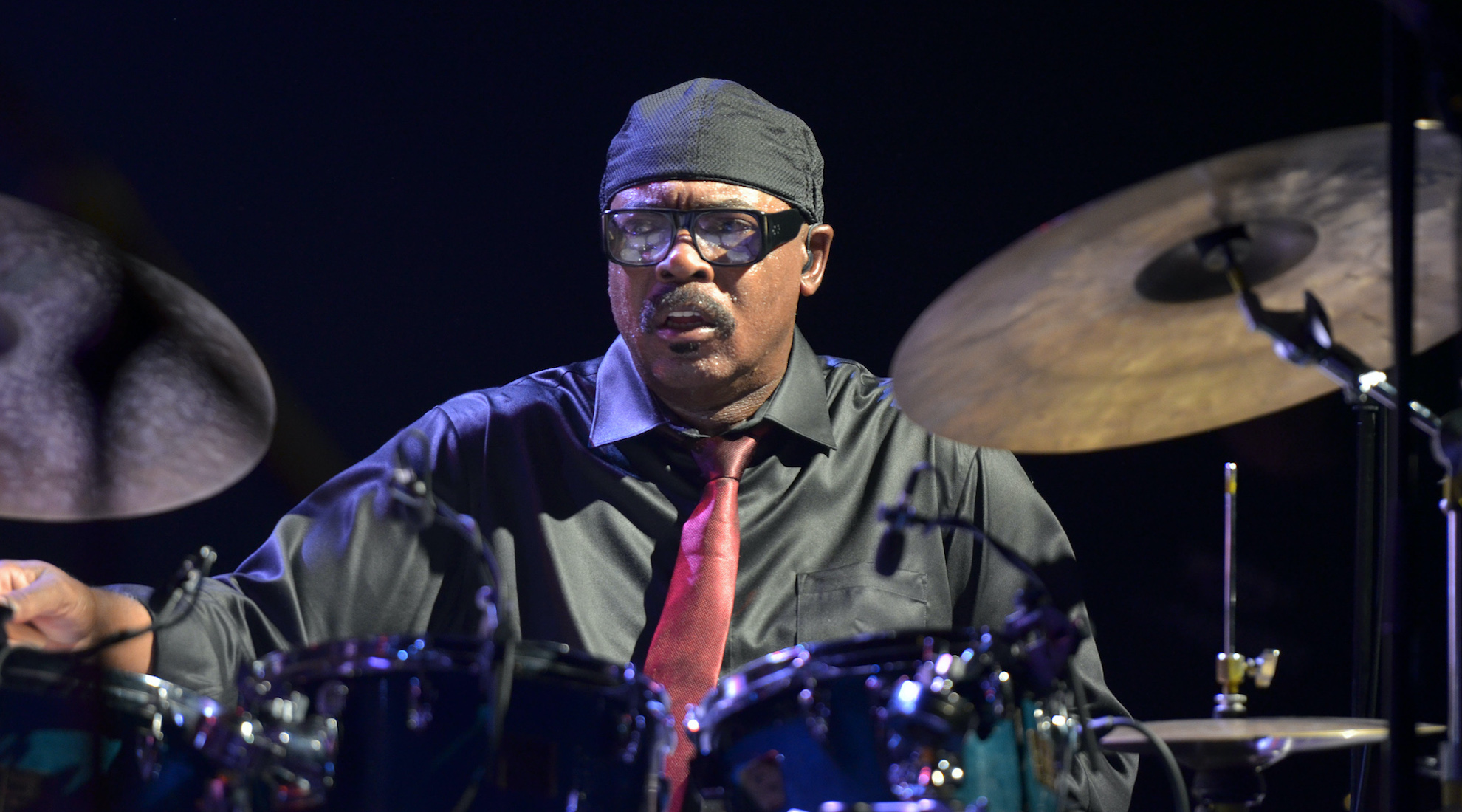
Jazz Monthly Feature Interview With Harvey mason
Among the nearly 1500 recording credits listed on All Music that are attributed to legendary drummer, composer and producer Harvey Mason is Herbie Hancock’s landmark 1973 album Head Hunters. In addition to Hancock’s classic “Watermelon Man,” the set featured the nearly 16 minute long excursion “Chameleon,” penned by Hancock and Mason with bassist Paul Jackson and saxophonist Bennie Maupin. Mason, whose ability to perform so many styles of music has long inspired people to refer to him as “The Chameleon,” revisits the tune as the closing set piece and title track of his highly anticipated debut on Concord Records.
Well known for the past quarter century as a founding member of contemporary jazz supergroup Fourplay (whose current lineup includes co-founders Bob James and Nathan East and guitarist Chuck Loeb) and also the father of multiple Grammy winning songwriter/producer Harvey Mason, Jr., “Mase” – working with co-producer Chris Dunn, Sr. Director of A&R for Concord Music Group – revisits a batch of other classic pieces from that era that he also played on as well. These include Grover Washington, Jr.’s “Black Frost,” Bobby Hutcherson’s “Montara” and Donald Byrd’s “Places and Spaces.”
While the personnel includes a handful of the drummers’ contemporaries (Jimmy Haslip, Bill Summers, John Beasley and Jackson), the fresh twist on these tunes is that Mason is playing with some of today’s brightest young jazz stars, some of whom he had not met before the live in the studio recording began. These include NEXT Collective alumni Christian Scott (trumpet), Ben Williams (bass), Kris Bowers (piano/keyboards), Matthew Stevens (guitarist), saxophonist Kamasi Washington, vocalist Chris Turner (lead on “If I Ever Lose This Heaven”), and keyboardist/electronica producer Mark de Clive-Lowe.
JazzMonthly: You released the Harvey Mason Trios 2 album Changing Partners in 2012, but your last full fledged solo album With All My Heart was about ten years ago. Why was now the perfect time to do the new one, and how did the deal with Concord come together?
HM: For years I had been busy performing in clubs & festivals in Japan, throughout Asia and Europe with Fourplay and my band. A few years ago, wanting to try something new, I put together an ensemble I called “The Chameleon Band” and played gigs at The Blue Note in Tokyo with Patrice Rushen, Jimmy Haslip and Bill Summers. The concept was playing tunes that people had never heard me perform live. The shows went well and I thought I should record these songs. When I returned to the U.S., I told my manager and she took the concept to Concord, where Chris Dunn became a big champion of the idea and helped me get the recording contract.
JM: Thematically, Chameleon takes a modern look at an eclectic group of seven contemporary jazz classics from the 70s. Did it start out with a driving concept or did it evolve once you decided to do a new album?
HM: It morphed into the concept of doing a total of seven classics after starting with me wanting to record more originals in that vein so it would sound more modern. It was Chris’ idea to revisit the seven tunes popular in that earlier era with young rising jazz stars arranging and performing with me. We also called Ben Wendel, founder of the Grammy nominated new age jazz band Kneebody who has toured with Snoop Dogg and Prince, to work with us and arrange the title track “Chameleon,” which became a schematics for the project. He helped us paint a whole different sound. I also had Bill Summers chant and whistle at the beginning of the end of “Chameleon,” like I did on the original “Watermelon Man.” We pulled all these elements together into a great arrangement.
JM: How did you choose the material? What do those songs mean to you personally? And why did you complement those with three cool interludes, all of which are very different?
HM: We just started listening to the original versions of the classics I had played on and thought about which ones would work in the current setting. Chris was once a DJ in Oakland and played a lot of songs from that time, plus he has his finger on the pulse of what young people are listening to today jazz-wise. He has long championed young jazz players, and he had good instincts about the kinds of older tunes they might enjoy interpreting in a modern context. I didn’t play on the original version of “If I Ever Lose This Heaven,” but he thought a vocal would round things out well. These songs are special because a lot of them were groundbreaking in their time and were part of that unique fusion era where jazz albums were starting to be big hits and become gold selling records.
I have fond memories from years ago of doing sessions every day where everyone was in the studio playing live and creating great energy. We captured that vibe on Chameleon by recording with everyone in the same room. The concept of the interludes “Looking Back,” “Studio Life (Hold It One Second)” and “Mase’s Theme” began while I was in Japan working with Paul Jackson. We laid down some grooves and wanted to create music on top of those to use on the CD. Then Chris recommended that I also work with Mark de Clive-Low, so the three of us ended up writing music together. There’s also a bonus track after “Chameleon” that we call “Looking Forward (Breaking Bad)” that is more progressive, intense with more effects than anything else on the album.
JM: What did you enjoy the most about revisiting these old songs? What do you think you bring to them now that makes them fresh and exciting for your fans today?
HM: I think what brings them forward is using these young upcoming jazz players to rearrange the songs in a cool way, adding some of today’s different changes to keep them interesting. Also serving to bring a fresh energy is the enthusiastic interplay that came from never having played together before these dates, then meeting and playing together in same room. Playing new material with great musicians you’ve never played with before creates an exciting energy where anything can happen. I knew what they were capable of, but just getting to know them as we were making the music took that sense of excitement and spontaneity to a whole new level.

